Starting a business is not an easy task; however, you can ease this process by finding and using the right tools to embrace your brand in many ways. In the present times, one of the most important aspects you need to be aware of when starting a business is brand awareness online. An online impact is crucial for any business to succeed; this is the reason most brands are using the internet as their main shop; this is what we know as e-commerce.
So, e-commerce can be seen as the thing of today. Currently, the popularization of online shopping has increased; especially during these times of pandemic. People prefer to buy online since it is easier, faster, and more comfortable. Therefore, the majority of entrepreneurs choose to install their businesses with a solid online presence, because it brings many benefits for both entrepreneurs and customers.
With this being said, the goal of this article is to help business owners to have an idea of the most essential thing they need to keep in mind: a reliable platform where they can improve, update and expand their brand to gain traffic and increase their sales. Although many could think it is a pretty difficult topic, the truth is that nowadays, there is an insanely wide range of software that allows inexperienced users to customize their websites in a very simple way. Here below you will find more information about e-commerce and the best platforms to start one.
1. Shopify
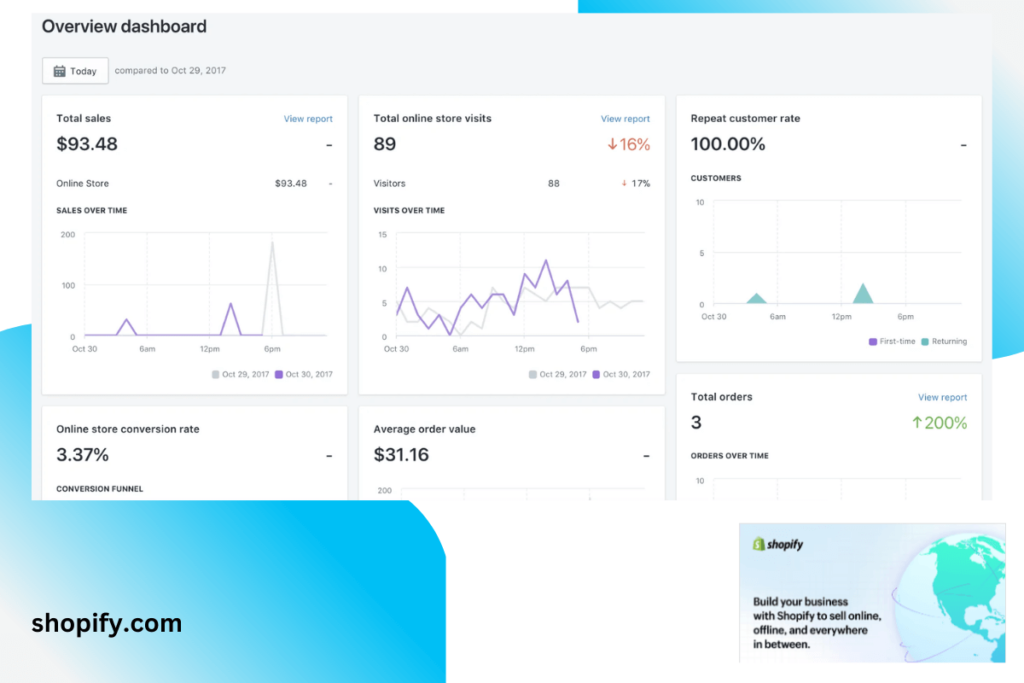
Shopify is nowadays the most popular platform for newbies in the field of online stores. It was created in 2004, and its popularity has increased in such a way that is now being used in more than 100 countries. Their drag and drop interface makes it perfect for e-commerce owners who have little technical skills. This platform is perfect if you are looking to settle a small to medium-size business; users can add advertising from social media such as Facebook or Instagram. Also, there is no need to integrate anything else, the platform offers great functions that ease configuration. Most beginners get really into this platform due to its vast list of applications, fast loading, and simple functions.
Shopify provides a great opportunity for beginners to easily manage all of its features; it also offers a huge range of templates that allow your site to have an original look. Even if you cannot understand some things, Shopify support will help you 24/7. You can enjoy a 14-day trial, and there is no need for a credit card. Unfortunately, this platform might be a bit expensive, since their apps could cost around $29 to $79 per month. It also offers limited ranking for SEO, which is a not-so-great aspect. Still, its allowance to build up a codeless site is a plus.
» MORE: Photographer Ecommerce Platforms
2. BigCommerce
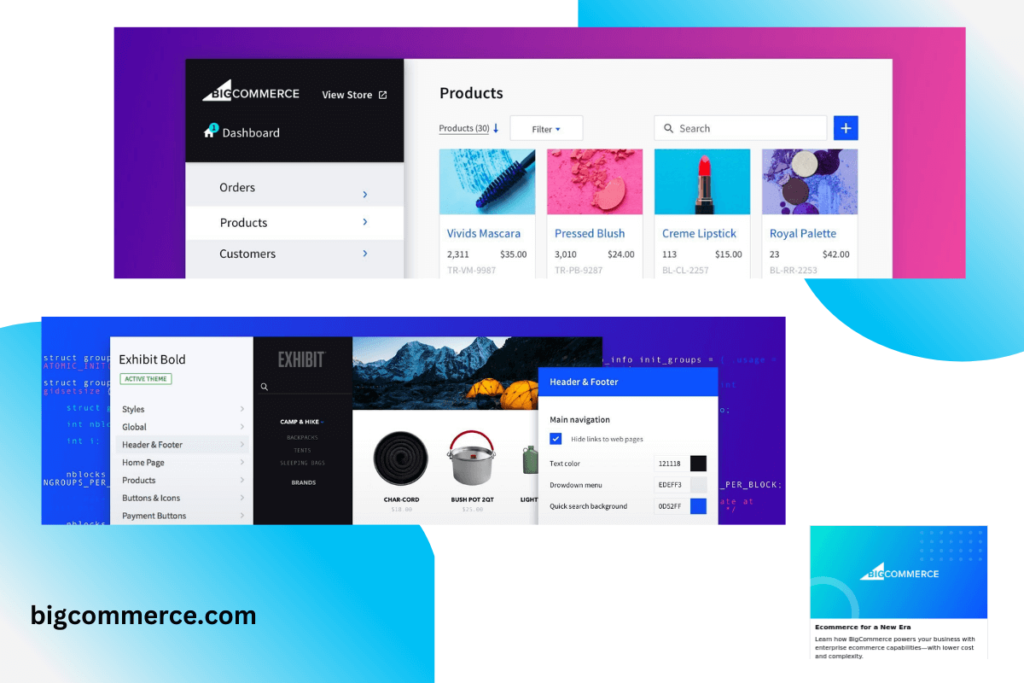
This platform is the favorite among B2B and B2C companies because it allows merchants to create aesthetic designs and engaging looks for their brand, as well as professional functionality and simple management. BigCommerce was created in 2009, and nowadays is being used in 150 countries, with more than 700 employees around the world. This platform for e-commerce is perfect for merchants who are looking to set medium to big-size businesses, with an extensive number of products and services. BigCommerce is a bit pricey, charging around $29 to $229, but since this platform is destined specially for e-commerce and large businesses that want to expand widely, it is definitely worth it.
Another great benefit BigCommerce provides is that you can optimize in SEO, you can find excels with multichannel selling, and its flexibility is incredible. The only cons you could find in this platform are the loading speeds and that it does not offer 1-click selling. Other than that, this platform is perfect for any beginning e-commerce. If you are going for a platform that offers you a great variety of pretty templates, this one for you.
» MORE: Best Ecommerce Platforms to Sell Wine
3. Wix
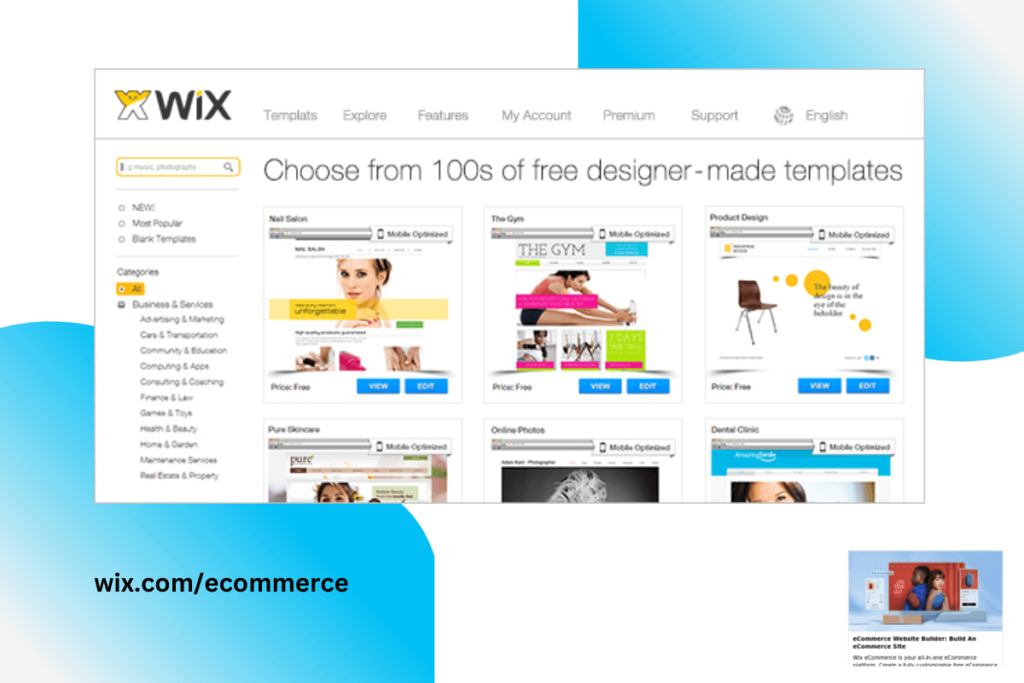
Wix is a platform created a couple of years ago, which means that its interface is pretty updated. Its drag and drop tools make this site very easy to use, so it is not necessary to have any technical skills to use this platform. Wix is a very flexible e-commerce builder that provides a wide range of templates; this allows entrepreneurs to create versatile and eye-catching online stores. Its popularity has escalated pretty quickly in the last couple of years, becoming one of the most used platforms for e-commerce building.
Among all of the benefits it offers, we can highlight its vast variety of themes which are offered freely for the users, and the simplicity in the setup. It also provides marketing automation; this is great for any beginner in the field. However, one of the weak features of this platform is the low optimization in SEO; not a prominent aspect if your goal is to rank in relevancy on Google’s search engine. It also lacks some upselling features and other important aspects like advanced automation. Although Wix may not provide the necessary features for a business that is looking to expand the highest boundaries, it is an amazing platform for beginners. Besides, it offers plenty of plugins that help users to improve their sites, make them look professional and settled.
» MORE: Florist Ecommerce Platforms
4. Volusion
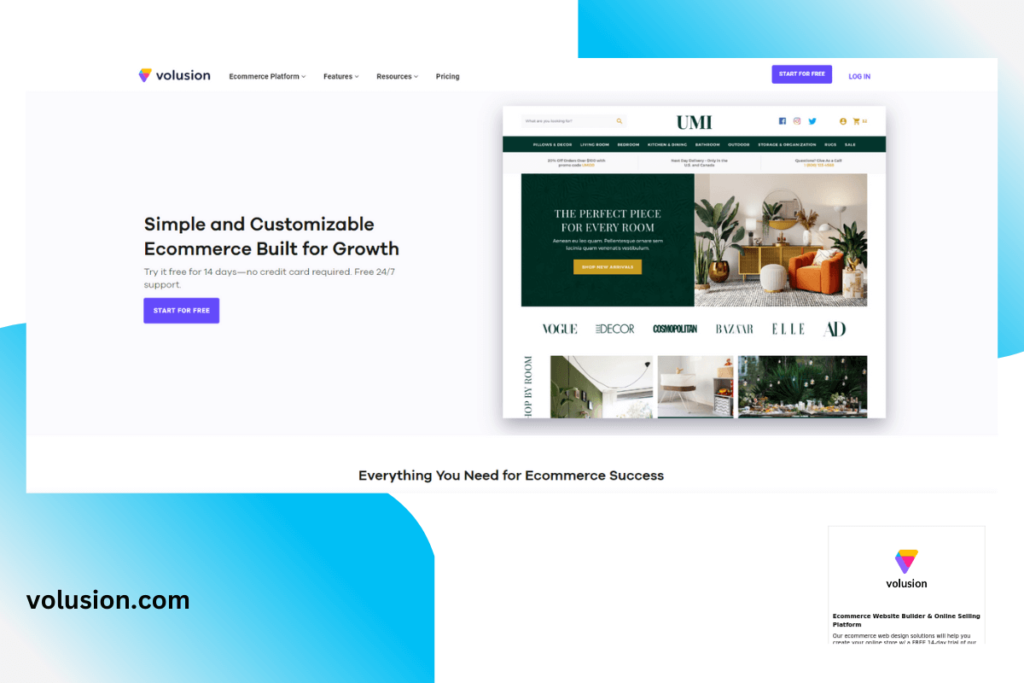
Volusion can be seen as a marketing precursor; it was created in 1999 and launched in 2002. Although many other recent competitors have had increased popularity in the market, Volusion has remained steady and relevant. Nowadays, this platform counts with a solid number of 30 thousand e-commerce sites all around the globe and has generated approximately more than $20 billion in incomes.
So, this platform is a good option for small businesses and beginner retailers who want to deep dive into the e-commerce world; it is easy to use and very flexible, with drag and drop functions and in-page editing. It is also an economic option if you are looking not to spend a lot on expensive e-commerce builders. But cheap does not mean weak; in Volusion you can find all the functionalities you need to create a professional site, it offers good onboarding, SEO optimization, and the possibility to sell on other platforms such as eBay, Amazon, etc.
Due to its long-time interface, some aspects of this platform can make your site look a bit out-of-date, and might be a very slow SaaS platform. You may also find poor URL structures and no built-in blogging functionality. So, if you are looking for a more updated website, this might not be the one for you, but as a beginner, this could be a great option.
» MORE: Printful Intergration Ecommerce Platform
5. Big Cartel

If you are looking to settle e-commerce that relies more upon artistic purposes, this is the platform for you. Big Cartel is destined to help those entrepreneurs who want to build online stores focused on artistic merchandise such as clothing, jewelry, and event photography. This platform provides great advantages for small business owners whose main goal is to escalate with no hurry but without pause. Its functions are pretty easy to manage and the prices are incredibly affordable. For beginners, this is a wonderful option, since the platform guides users as they are building up their websites.
Customer support is great and provides help in many ways; social media, email, online help, etc. The only con you could find in Big Cartel is its limited features, which is not great if entrepreneurs are going for a more large-size business and want to expand their brand a lot wider. Despite this, you will find other great benefits by using this platform; it also includes Google analytics integration.
» MORE: CBD Ecommerce Platfrom
6. Magento
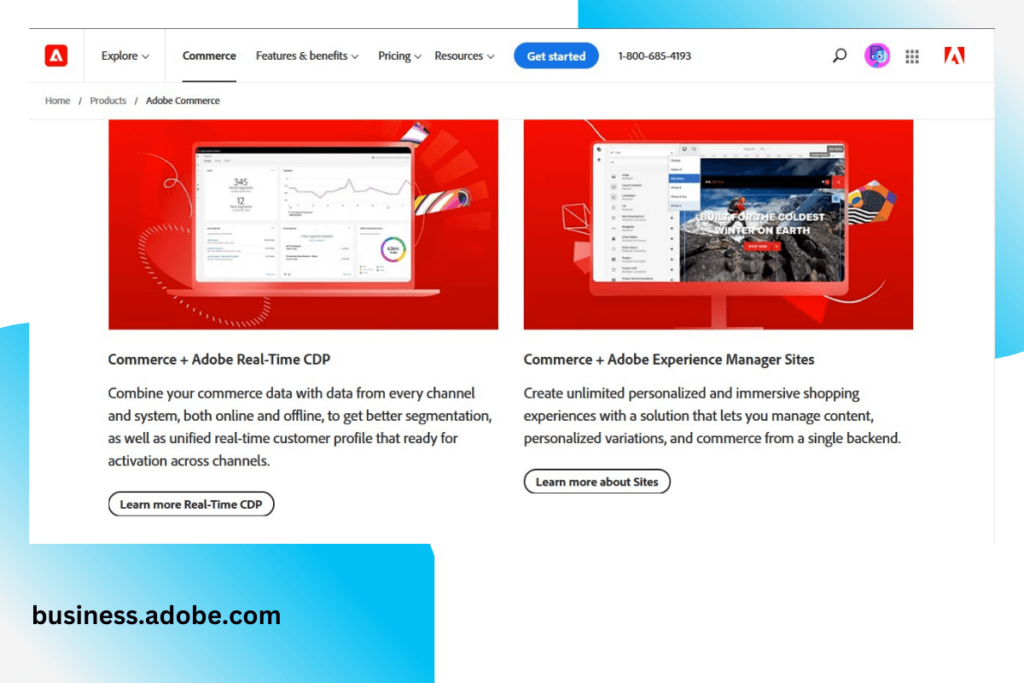
Magento is an open-source platform and has become one of the most popular e-commerce builders in the world. This site is highly supported by worldwide brands like Nike and Cisco; an obvious plus. It was released in 2009, but in 2015, it was improved and converted into Magento 2.0; the creators had developed many features such as usability and code bases. If you are going all the way for luxurious and well-prepared e-commerce, this platform will provide anything you need to achieve it. It is interesting to remark that in 2018, Magento was bought by Adobe, who created two versions of this platform called Magento Ecommerce and Magento Open Source, each of them for different purposes.
This site is destined to improve those small or medium-sized businesses that are looking to gain more traffic quickly and improve their demand. One of the greatest benefits this website offers is its incredibly vast list of extensions; however, this means that entrepreneurs will need to invest in developers to use this e-commerce builder since it does not offer simple usability. It also has some quite pricey themes, which demands users to have a large budget for its use. Nevertheless, Magento is a splendid e-commerce platform to expand quickly; its optimization for SEO is one of the best in the market, along with many other interesting features you might find.
» MORE: Design Service Ecommerce Platform
7. Squarespace
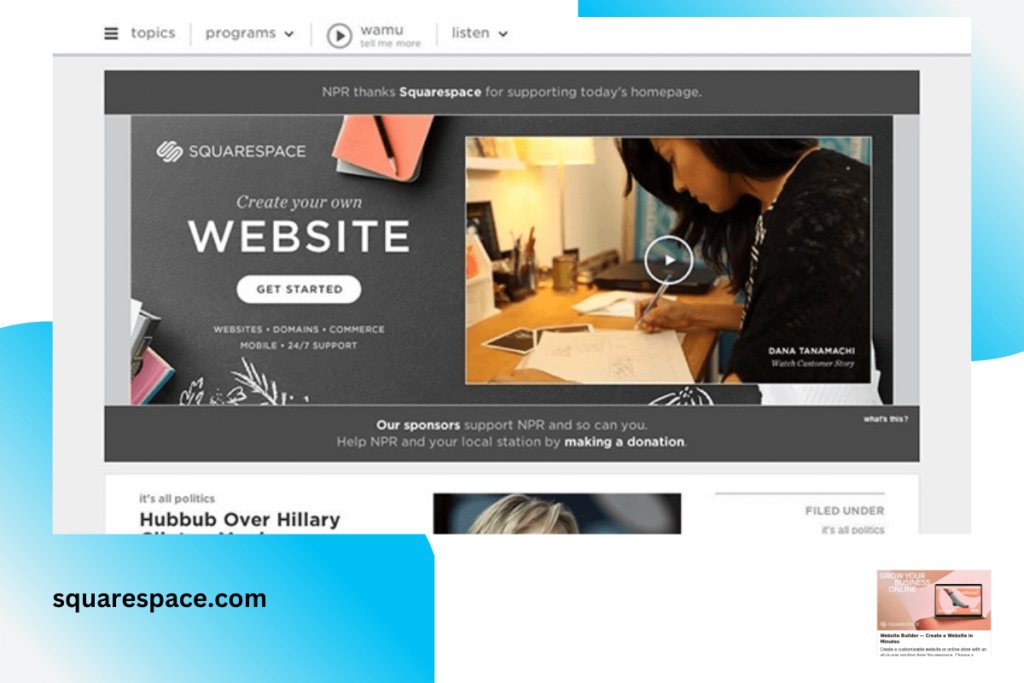
Based in New York, Squarespace was created in 2003. It is a SaaS platform that offers drag and drops functionality. This platform was created to help small businesses to create and host their e-commerce stores. It is very simple to use and offers a wide range of amazing templates to make websites have a good-looking design. The Squarespace functions are so simple that it is perfect for small businesses and retailers with little technical skills. It is also an affordable option; however, they will charge 3% on transaction fees.
Other benefits include strong SEO optimization, social selling, analytics integration, and inventory. One big con you might find on this site is that they do not offer many payment gateways, so that could be an issue for many businesses. Also, their customer support is not available on phone, but you can find it online, on social media, and by email. You should definitely consider this platform if your skills in online store building are not so extensive; its usability is so simple and all of the setups are already there, so you can find all of the features you need.
» MORE: T-Shirt Ecommerce Website
8. WooCommerce
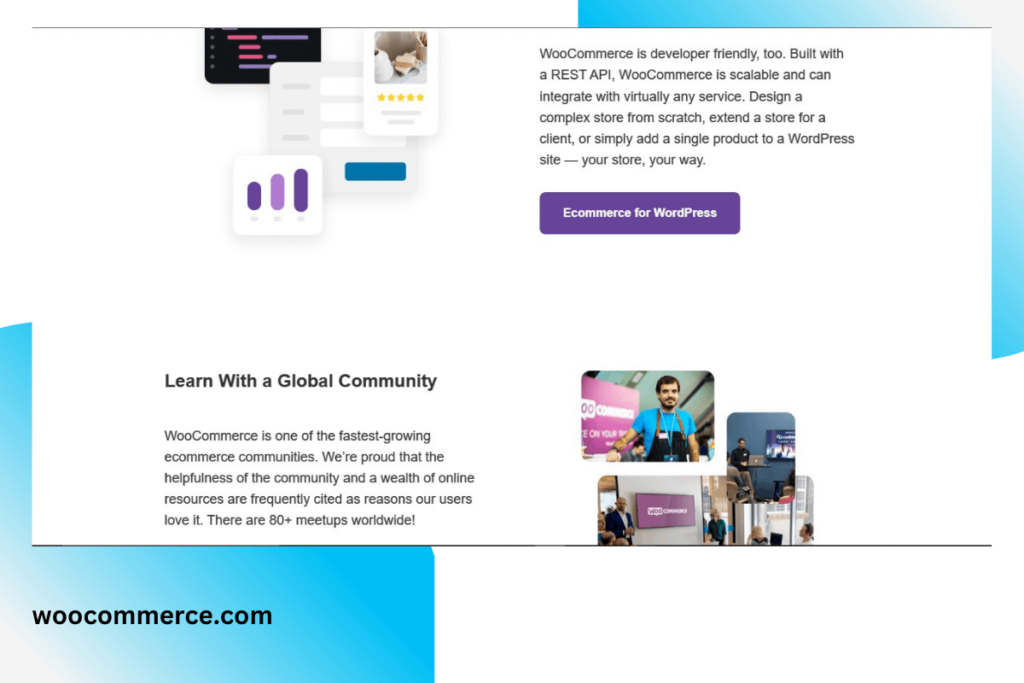
This site was developed by WordPress as an open-source cart plugin. Although other platforms like Shopify and BigCommerce are strong competition, Woocommerce does not stay behind. This platform is one of the most recommended for e-commerce store building. It offers the best marketing services; including SEO optimization. Other extensions offer integrations for social media, email marketing, and 1-click selling. This is an amazing option to develop and expand your brand. It is important to remark that 30% of all sites on the internet are run by Woocommerce.
This platform is already pretty easy to use, but if you have some experience with WordPress, this will be a lot simpler for you. One great advantage of this site is its customization; you can add great designs and make your site look eye-catching and professional. Woocommerce is a bit expensive, especially when it comes to self-hosting; this same issue applies to WordPress, so it is not a surprise. Despite this, you can find great options in Woocommerce that will allow your site to look fresh and professional; as well as expanding the name of your brand.
» MORE: Best Ecommerce Platforms For Musicians & Bands
In conclusion, the more you investigate the best platform for your e-commerce, the better chances you have to gain ground and raise the awareness of your brand. It is essential to understand each platform’s features to find the one that works best for you. Remember that enhancing an authoritative presence online is key to help your business gain popularity and improve sales. Also, take into account that all of these platforms we have just listed above, have their strong and weak features; it is up to you to choose the one that covers all of your needs.
